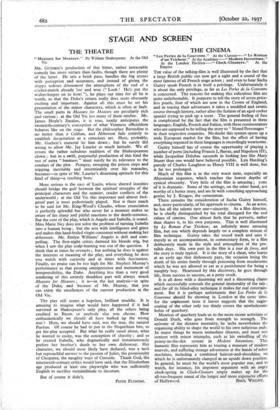STAGE AND SCREEN
THE THEATRE
" Measure for Measure." By William Shakespeare. At the Old Vic
MR. GUTHRIE'S production of this bitter, rather intractable comedy has more virtues than faults, though there are plenty of the latter. He sets a brisk pace, handles the big scenes with perception and assurance, and• instead of giving the sloppy tedious denouement the atmosphere of the end of a cricket-match already lost and won (" Look ! He's put the wicket-keeper on to bowl "), he plays out time for all he is worth, so that the Duke's return really does seem obscurely exciting and important. Against all this must be set his presentation of the minor characters, which is often at fault. The small parts in Measure for Measure are peculiarly rich and various ; at the Old Vic too many of them misfire. Mr. James Hoyle's Escalus, it is true, neatly anticipates the twentieth-century's conception of what Viennese officialdom behaves like on the stage. But the philosopher Barnadine is no better than a Caliban, and Abhorson fails entirely to establish decapitation as a conscious art. Here, probably, Mr. Guthrie's material let him down ; but he surely did wrong to allow Mr. Jay Laurier so much latitude. We all revere the rather nebulous tradition of the Shakespearean clown ; but in a swift, purposeful production of this kind the test of extra " business " must surely be its relevance to the conduct of the plot. Pompey, sweeping the prison steps and tripping inevitably and interminably over his manacles, becomes—in spite of Mr. Laurier's disarming aptitude for this kind of thing—a crashing bore.
More serious is the case of Lucio, whose shrewd inanities should bridge the gulf between the spiritual struggles of the principal characters and the seamier, cruder conflicts of the underworld ; at the Old Vic this important and almost fool- proof part is most pedestrianly played. Nor is there much to be said for Mr. King-Wood's Claudio, whose enunciation is perfectly splendid but who never for a moment makes us aware of his sharp and pitiful reactions to the death-sentence. But the core of the play, which is Angelo and Isabella, is sound. Miss Marie Ney does not solve the problem of turning Isabella into a human being ; but she acts with intelligence and grace and makes this hard-boiled virgin consistent without making her abhorrent. Mr. Emlyn Williams' Angelo is deft and com- pelling. The first-night critics damned his blonde wig, but when I saw the play scalp-hunting was out of the question. I think that at times he overacts ; but nothing he does is against the interests or meaning of the play, and everything he does you watch with curiosity and at times with fascination. Finally, no praise can be too high for Mr. Stephen Murray's performance as that prosing omnipresence and monument of irresponsibility, the Duke. Anything less than a very good rendering of this entirely thankless part will always wreck Measure for Measure ; it is—in the last analysis—in spite of the Duke, and because of Mr. Murray, that you can enjoy the excellences of the current production at the Old Vic.
The play still seems a hopeless, brilliant muddle. It is amusing to imagine what would have happened if it had survived as Shakespeare's only play, all the others being credited to Bacon or anybody else you choose. How enthusiastically we should all have barked up the wrong tree ! Here, we should have said, was the true, the natural Puritan. Of course he had to put in the Hogarthian bits, to get his• play accepted. But what he really cared about, what he wanted to ensky, was the conception of chastity ; and so he created Isabella, who dogmatically and instantaneously prefers her brother's death to her own dishonour. Her character, we should most likely have deduced, was a tacit but reproachful answer to the passion of Juliet, the promiscuity of Cleopatra, the naughty ways of Cressida. Thank God, the nineteenth-century critics would have said, that the Elizabethan age produced at least one playwright who was sufficiently English to sacrifice verisimilitude to decorum.
But of course it didn't.
PETER FLEMING.






























































 Previous page
Previous page